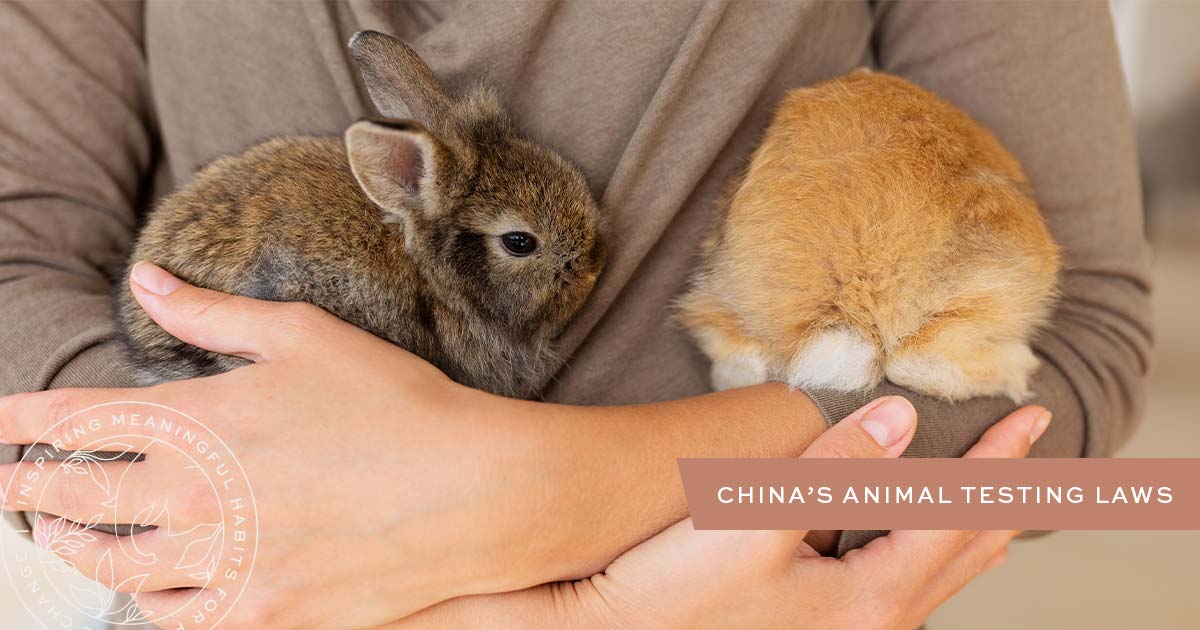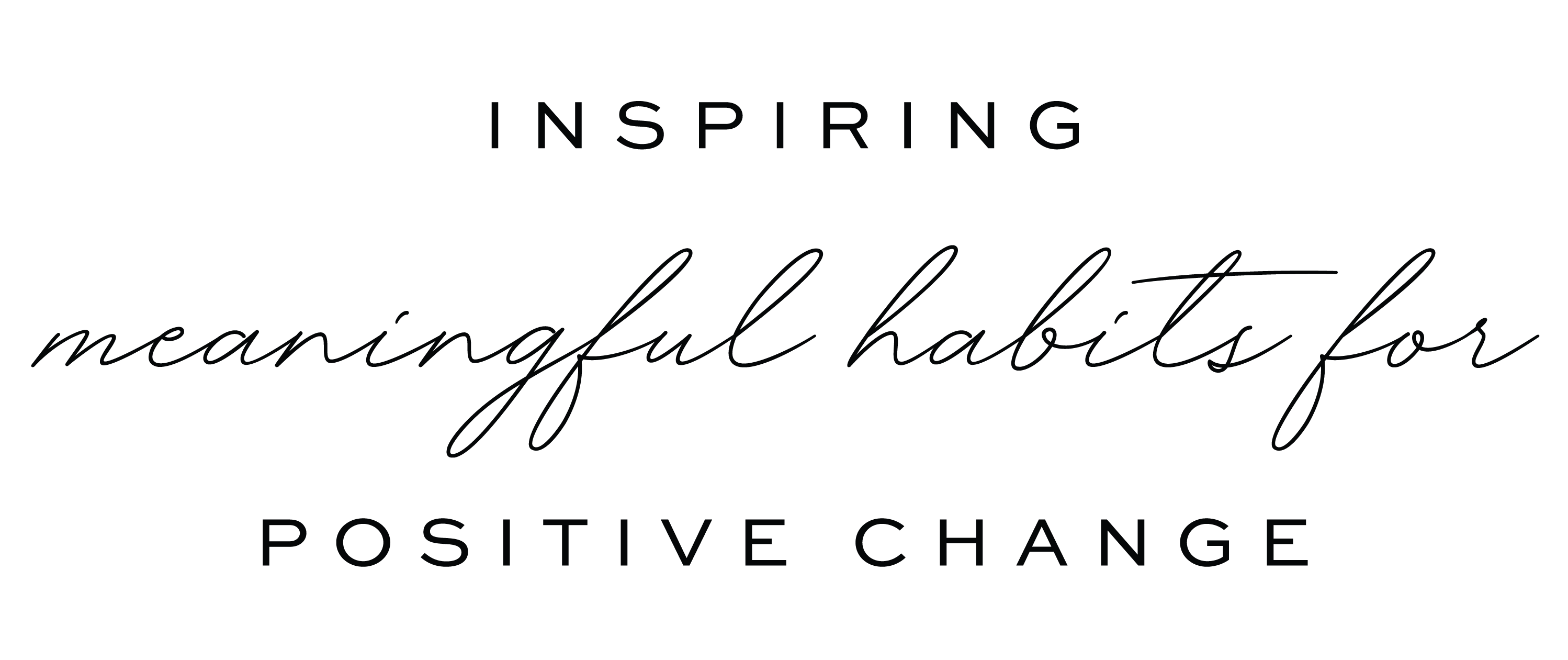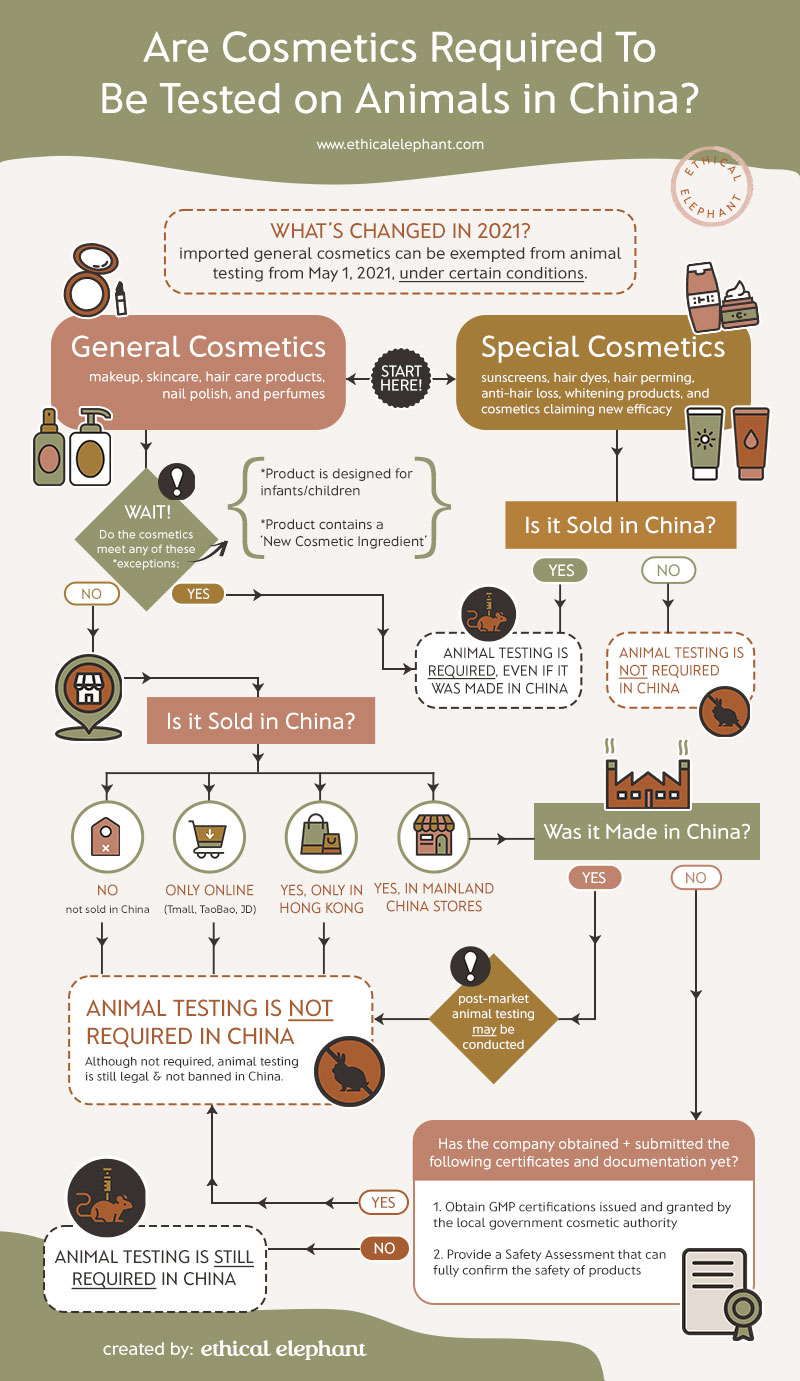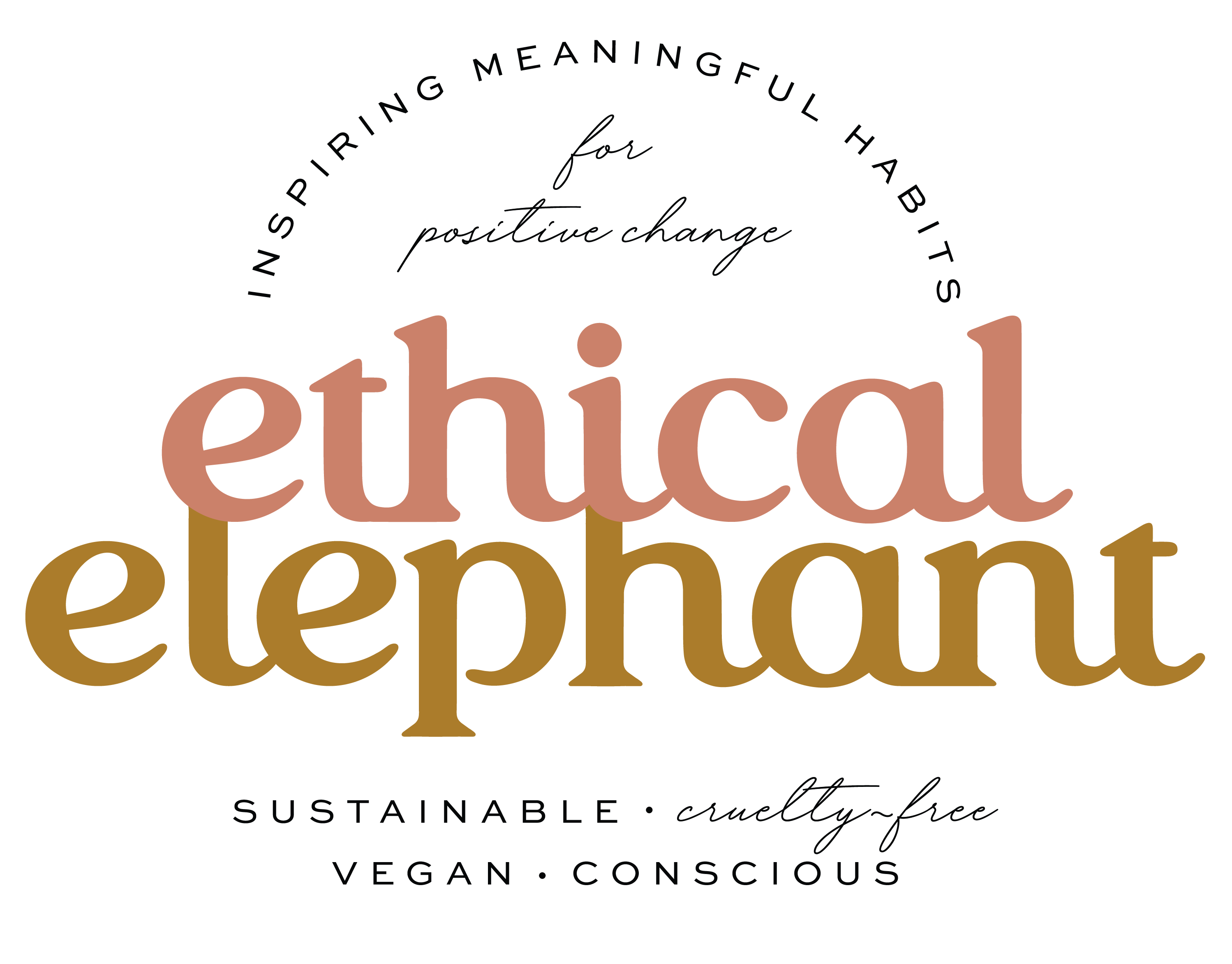This post may contain affiliate links that at no additional cost to you, I may earn a small commission.

On May 1, 2021, China implemented updates and changes to its animal testing laws. Under the new regulations, some cosmetics may qualify for an exemption and potentially avoid animal testing while selling in China.
Note that the changes do not apply to all cosmetics. Companies also must jump through hoops while meeting specific criteria before being exempt from China’s animal testing requirements.
This can be confusing to understand from a consumer standpoint. So, I’ve created an infographic to help illustrate and navigate through China’s latest animal testing laws.
You’re welcome to share the infographic, but please do not edit, crop, translate, or modify the original image in any form.
China & Animal Testing FAQs
See below for a list of frequently asked questions I get about China’s animal testing laws:
What’s the difference between General Cosmetics vs. Special Cosmetics?
Special Cosmetics (or Special-Use Cosmetics) are products that make a functional claim, like hair dyes, hair perming products, sunscreens, whitening products, anti-hair loss, and cosmetics claiming new efficacy.
General Cosmetics (or Ordinary Cosmetics or Non-Special-Use Cosmetics) are pretty much everything else and include makeup, skincare, hair care products, nail polish, and perfumes.
Are cosmetics ‘Made in China’ required to be tested on animals?
No. If a company manufactures its cosmetics in China, it does not mean they are required to test on animals.
In fact, since 2014, general cosmetics that are manufactured and sold in China do not require pre-market animal testing if reliable safety assessment reports are provided.
Animal tests are required for some cosmetics that are imported and sold in China.
A cosmetic company says they only sell online to China, are they required to test on animals?
No. As long as the company is only selling its cosmetics online and then shipping directly to its customers in China, they are not required to test on animals. The same goes for cosmetics sold on online Chinese shopping websites like Tmall, Taobao, or JD, which do not require animal testing.
Animal tests are only required for cosmetics that are sold in physical stores (and not online) in mainland China.
Do cosmetics sold in Hong Kong require animal testing?
No. Since Hong Kong is not part of mainland China, they don’t have the same animal testing laws. Cosmetic companies can choose to only sell in Hong Kong stores and will not be required to test on animals.
What is post-market animal testing?
Post-market testing is conducted after the cosmetic product is sold in China. It’s the opposite of Pre-market testing, where tests are conducted before the products are available for sale.
Post-market testing in China may be conducted in the event of a customer complaint or safety concern, but experts say post-market testing on animals is uncommon and highly unlikely.
In the unlikely event that post-market testing is required, some authorities and companies claim they will be notified and have the opportunity to recall their products rather than have them tested on animals.
Are sunscreens and hair dyes sold in China required to be tested on animals?
Yes. Sunscreens and hair dyes are considered ‘Special-Use Cosmetics,’ if they’re sold in China, they are still required by law to be tested on animals.
So, does that mean a brand’s ‘General Cosmetics’ can be considered cruelty-free but not their sunscreens and hair dyes?
When we evaluate brands to determine if they’re cruelty-free or not, we generally look at the overall brand and not individual products. If a brand sells some of its ‘Special-Use Cosmetics’ in China, they choose to engage and pay to have those products tested on animals. Therefore, we wouldn’t consider the brand to be cruelty-free even if they sell some General Cosmetics that may be exempt from animal testing. Brands can’t be 78% cruelty-free. It’s either 100% or not.
A ‘cruelty-free’ brand selling in China also sells ‘Special-Use’ products like sunscreen; how can they be cruelty-free then?
To remain cruelty-free, companies must agree not to sell any products in China that may trigger animal tests, like sunscreens, hair dyes, products marketed to children or breastfeeding parents, or products containing a ‘new cosmetic ingredient.’
That means companies selling in China must be selective about what types of products they choose to sell there and must refrain from offering other products that could trigger animal testing.
For example, Dove sells its products in China. If they want to remain cruelty-free, then they are not allowed to sell their deodorants that claim to be “antiperspirant” as this would be considered a ‘Special-Use Cosmetic’ and will require animal testing.
Another cruelty-free brand selling in China is Aesop, they claim that due to China’s animal testing laws, only some of their products are available in China. And some of their other products that are not available for sale in China did not qualify for exemption from animal testing, and therefore, they made the conscious decision not to sell those products there.
Does this mean a lot of brands are now considered cruelty-free that have been selling in China all these years (like MAC Cosmetics, L’Oreal, Estee Lauder, Aveeno)?
No. Companies must obtain and submit the proper certificates and documents from specific authorities to be exempt from China’s animal testing requirements.
In other words, companies will need to jump through hoops and hurdles before they can export and sell their cosmetics in China while avoiding new animal tests.
Only cosmetic companies that are willing and able to go through the proper process will be considered cruelty-free in the future.
Is animal testing for cosmetics in China banned in 2023?
No. China has not banned or made it illegal to test cosmetics or their ingredients on animals. These new changes have only lifted the requirement for some (not all) cosmetics imported and sold in their country.
Although it’s not required, it’s still not illegal if companies or suppliers choose to conduct animal tests in China.
How do we know if brands selling in China are being truthful about being cruelty-free?
Leaping Bunny recently announced its China Qualification Program, where brands can go through the process of selling in China under their supervision while remaining cruelty-free. You can follow them to discover which brands are part of this China program. Since their announcement, they’ve only stated Burt’s Bees was one of the brands on board. I’m not sure if they’ll provide a public list of brands in the program.
Other than taking the company’s word, there’s no ‘true’ way to know with certainty which brands are being honest and have avoided all of China’s animal testing requirements.
My takeaway is that the only way through this is by asking brands to be more transparent about the steps they’ve taken to avoid animal testing while selling in China.
So, how do we know if brands are cruelty-free if they’re sold in China?
With the recent changes to China’s animal testing laws, I have decided to include some brands that are selling in China in our Cruelty-Free Brand Directory. Only if they are transparent about the steps, they’ve taken to ensure none of their products or ingredients are required by law to be tested on animals while selling in China.
These are the things I look for when verifying a brand is ‘cruelty-free’ while selling in China:
Companies must meet ALL of the following criteria first:
- ONLY sell ‘general’ cosmetics in China (like makeup, skincare, haircare, nail polish, and perfumes)
- must NOT sell any ‘special’ cosmetics in China like sunscreens, hair dye, hair perming, or other cosmetics claiming new efficacy
- must NOT sell products designed for infants, children, or pregnant and breastfeeding parents in China
- must NOT sell products that contain a ‘New Cosmetic Ingredient’ in China
- AND if post-market testing is required, then the company must have a policy in place where it will RECALL its products rather than allow its products to be tested on animals
Also, products must meet ONE of the following to avoid animal testing in China:
- manufactured in China, or the final assembly is in China
- if manufactured outside of China and then exported to China, companies must obtain the proper safety certificates from their country of origin
So far, I have concluded the following brands that are selling in China to be cruelty-free: Aussie, Burt’s Bees, Charlotte Tilbury, Davines, Dove, and First Aid Beauty.
Physicians Formula and Wet n Wild NOT be relisted as cruelty-free because of their lack of transparency and shady past of lying about selling in China in the first place.
Summary:
China’s animal testing regulations are changing. Before, it was very simple, if a brand sold any of its products in China, it couldn’t be considered cruelty-free as they were required by law to test on animals in China.
Now, it’s a little more complicated with China’s recent changes to its animal testing laws. Companies can now sell some cosmetics (but not all) in China without having to test on animals.
But companies will need to follow specific criteria to qualify for an exemption. Therefore, many brands that have been selling in China this entire time are not quite cruelty-free yet. Brands must prove all their products (not just some) meet the criteria for an exemption while providing the proper safety certificates from specific authorities.
Currently, Leaping Bunny is the only third party that offers a program where companies can sell in China under their supervision (where companies must go undergo a series of pre-market and post-market audits.)
Other than that, it’s ultimately left to cruelty-free and ethical consumers to ask companies how they can sell in China without testing on animals and hope brands are telling the truth.
Further Reading on China’s Animal Testing Laws:
- What’s Going On With China’s Animal Testing Laws
- The Truth About Post-Market Animal Testing in China
- ChemLinked is a great resource for staying on top of China’s new regulations, this article breaks down China’s pre-conditions and exceptions
*Important Note: We can address China’s animal testing laws and regulations without criticizing the country, its culture, or its people. Or bring up the virus. I will not tolerate any comments that have racist or xenophobic undertones and will delete such comments from my site.










49 thoughts on “China’s Animal Testing Laws in 2023 – Everything You Need To Know”
Thanks for the post, Vicky. You’re probably unaware, but the Google ad in your sidebar is showing an Estee Lauder product, and according to PETA that company currently tests on animals.
Arghs, I know! It drives me crazy, been trying to find a way to prevent them from showing up on my blog! =( Thanks for the heads up, David!
Hello Vicky, i hope you are reading this.
I am kind of new to this whole thinking of cruelty-free (since i always kind of thought.. such a thing like testing on animals wouldnt be on this world anymore.. but yeah, i was naive) however.. i really have a question to you. and hope you might can answer it.
It is about moroccanoil.com
They sell to china now. they sell to ten hairdressers and spas. -> http://www.moroccanoil.com/ca_en/salon-spa-locator
what does that mean for that? are they cruelty-free?
since i believe these stores have their products via online-stores? and as i read.. they dont test then?
or am i wrong?
how can i find out?
I nearly searched everything. and i dont believe im getting a really satisfying answer either from their website.
still. i am super in love with their products but want to make it sure.. before i am using them again.
sorry btw for my bad english. i am from germany.
Hey Kira!
Glad to hear that you’re switching over to cruelty-free products! =) I know, it’s 2016 and some companies are still testing on animals! Such a shame.
I’m happy to hear you’re asking all the right questions too! I haven’t done much research on Moroccan Oil yet but there have been rumors circulating online that they are indeed selling their products in mainland China.
The best way to get a solid answer is to email them and ask if any of their products are sold in mainland China. I have a feeling that those 10 hairdressers and spas you mentioned ARE selling Moroccan Oil products and not just online but I don’t know for certain unless they admit it.
I’ll send them an email right now and see what they’ll say! I’ll follow up with you once I hear back! =)
Hi again Kira, they surprisingly got back to me quickly.
This is what they said after I asked whether if Moroccan Oil products are sold in mainland China where animal testing is required:
“As we are just beginning to enter the international market, we currently do not have distribution in China at this time; therefore you will not be able to purchase our products.”
It sounds like they’re gearing up to sell their products in China. It’s not clear whether or not they’ll be exclusively selling via online retailers. They also didn’t address the issues of China’s animal testing requirements. To me, it doesn’t sound like they care about the issues of testing their products on animals in order to sell in China so sadly, I wouldn’t consider Moroccan Oil to be a cruelty-free brand.
I would recommend trying cruelty-free haircare brands like John Masters Organic, Giovanni, Paul Mitchell, Yarok instead =)
Oh wow, thank you so so much for your fast answer! <3
Sadly i wasnt on the internet yesterday.
I am so thankful that you already contacted them and asked for that. But somehow sad that they gave this answer… however. thank you so so much for your help!
I really hope they change their mind some day. But till now i will definally try some of the brands you mentioned!
(My hair is really sensitive. So i hope the best :D)
Also i am trying to look around your blog now to change my products time by time (when theyre empty) to get the right things and finally be able to support cruelty-free.
This might be a dumb question too… but everything which is a vegan product should be cruelty-free, right?
Would be a little weird if its not..
Also again.. cant say it enough, thank you!
I was also disappointed to hear that response from Moroccan Oil too! I really do hope they step it up and if they enter the Chinese market, that they’ll address the issues of animal testing sooner rather than later!
Yes, on ethical elephant.. when I mention something is vegan, I mean that it’s also cruelty-free =) BUT I can’t say the same about other websites or even companies when they use the term “vegan” to describe their products.
Sometimes vegan doesn’t automatically mean it’s cruelty-free. (I know, seems a little strange!) but I go into that a little more in this post here: https://ethicalelephant.com/crueltyfree-vs-vegan/
Hope that helps ya out, Kira! =)
Hey Vicky!
Thanks a lot for posting such clear piece of information 🙂 Is this the current status, as of today’s date: 29th August, 2016?
I’ve been asking some of my favourite brands this question, and sadly, no good responses came out :(, except maybe for Uriage: they already emailed me 3 times telling me they don’t test on animals, but I keep insisting on the Chinese laws. I’m now waiting for their response on whether they just sell online in China or if they sell there physically. Fingers crossed!
Since I’m on the subject, do you know the status of that company?
Also, can you please tell me a few good, known brands that are cruelty-free and that you know of?
Thank you very much!
Ana
Hi Ana,
A good way to find Cruelty free brands is on the Choose Cruelty free website. http://www.choosecrueltyfree.org.au/cruelty-free-list/
I manufacture vegan, Certified cruelty free skincare products and only sell in Australia. I’ve been creating since 1989 and am passionate about ensuring every ingredient is cruelty free including absolutely palm oil free products.
We are passionate manufacturers and we are out there! <3
Hi VIcky
We now know that China law require animal testing in order to sell but WHY?
Hi Vicky
I’m still a little confused?
so if i buy a cruelty free brand in England and the label states made or produced in China
is it still cruelty free?
Hey! As long as this product is not sold in China then animal testing shouldn’t be required
Yes, exactly what Milena said is true. It’s only an issue if the products are SOLD in China. If you’re buying a cruelty-free brand in England but they say that they make or produce their products overseas in China, BUT they don’t distribute or sell in China… then they’re still cruelty-free.